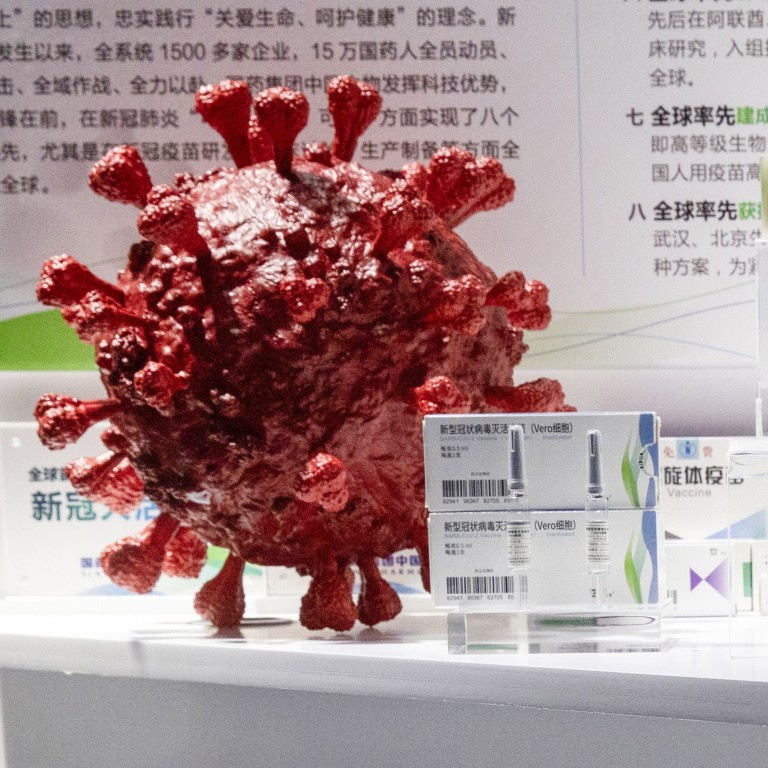
Coronavirus: fifth Chinese Covid-19 vaccine candidate ready to enter phase 3 trials
- Anhui Zhifei Longcom Biopharmaceutical looks to recruit 29,000 people for final tests, first of which will start this month in Uzbekistan
- Announcement comes as China National Biotec Group says it is preparing to review the results of final stage trials of two of its products
Anhui Zhifei Longcom Biopharmaceutical said on Thursday it was planning to recruit 29,000 people aged 18 and older for phase 3 trials of its recombinant subunit vaccine candidate. The first of the tests would begin later this month in Uzbekistan, followed by Indonesia, Pakistan and Ecuador, it said.
The news comes as state-owned China National Biotec Group (CNBG) on Friday began reviewing the phase 3 trial data for its two inactivated vaccines, Yang Xiaoming, chairman of parent company Sinopharm, said.
Professor Yan Jinghua from the Institute of Microbiology at the Chinese Academy of Sciences, whose team developed the Anhui Zhifei Longcom vaccine, told an industry conference on Friday that early stage trials had shown the product to be safe and capable of producing high levels of antibodies.
While the results of the phase 2 trials, which ended at the end of October, had yet to be published, Yan said the safety data was “excellent” and 97 per cent of trial participants developed high levels of neutralising antibodies, an indicator of immunity.
The antibody level in the test subjects was twice that found in a sample of 89 people who had recovered from Covid-19, she said.
The product is the first recombinant subunit vaccine in China to enter phase 3 trials.
“The vaccine involves protein so it doesn’t require a high biosafety level production facility [as needed for inactivated vaccines]. The production process is very safe, which guarantees accessibility to the vaccine,” Yan told the conference in Zhuhai, which was organised by the China Association for Vaccines.
The technology had previously been used in the development of vaccines for hepatitis B, human papillomavirus and influenza, she said.
Pfizer and BioNtech to seek emergency US approval ‘within days’ after better-than-expected test results
Speaking on the sidelines of the conference, Sinopharm’s Yang said CNBG was expecting to review the data from the phase 3 trials of its Covid-19 vaccines on Friday.
“I must return to Beijing today for an urgent matter … we will have a partial review of the data of our vaccines,” Yang, chairman of Sinopharm, said.
“We had part of the data reviewed recently and I am going back today to handle it. I am not at liberty to disclose details, but the results are good,” he said.
The inactivated vaccines developed by the state-owned CNBG have been undergoing final stage trials in 10 countries outside China, the first of which began in June.
More than 50,000 people had received the first of a two-dose regimen, with 48,000 of those going on to have the second, Yang said.
Zhong Nanshan, one of China’s top respiratory disease experts, said at the conference attended by Yang that he was confident the Chinese vaccines would have good efficacy rates.
On the success of the foreign vaccines, he said: “Pfizer and Moderna have already published their results and the whole world is excited about it, but I am not impressed.”
US, China must come together to beat Covid-19, academics say
“I don’t care if the efficacy reaches such a high level, like 95 per cent,” Zhong said. “[Our] vaccine is effective and it can be produced on a large scale, and that’s the biggest guarantee.
“I suggest [we] keep an open mind about all types of vaccines as we don’t know how protective the [mRNA] vaccine will be, how long the protection will last and how significant the adverse effects will be in the long run,” he said, referring to the technology used by Pfizer-BioNTech and Moderna.
“With the exception of emergency use authorisation, a vaccine needs at least six months to determine its [true efficacy],” Zhong said.
Yang said tests had shown he still had antibodies in his system six months later.

